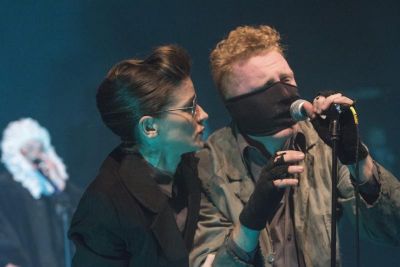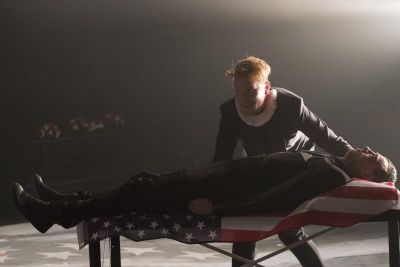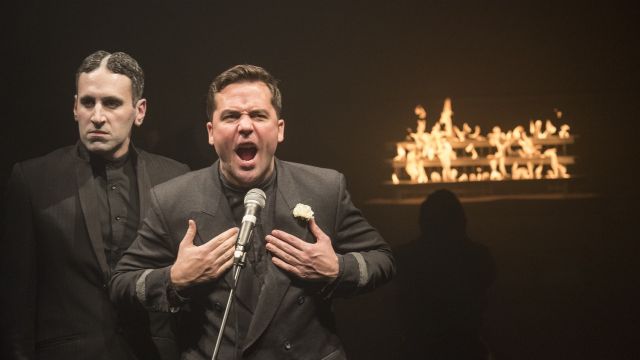The Resistible Rise of Arturo Ui
The temptation – in the age of Trump – to update and make ‘accessible’ Brecht’s satiric parable about the rise of Hitler and the Nazis is well nigh irresistible – and this production gives in to it. The play is not exactly Brecht’s best work, but it is continually revived: it has a black, cynical and chilling humour and its warning of incipient fascism is, sadly, ever topical. Written in 1941 and intended for the American stage, Arturo Ui was not, in fact, performed until 1958 – and in Germany. (Hence the famous warning in the very last lines, after Hitler’s demise: ‘…the bitch that bore him is in heat again.’) The play is set in Brecht’s version of Chicago – a version largely derived from the pulp fiction detective novels he admired – for their plots. Brecht eschewed setting his dramas in contemporary reality, arguing that the response to his arguments would be diverted by too much attention to what detail he’d got right, and what wrong.
My translation of the text by Ralph Manheim is pretty ponderous, long-winded and heavy handed – it reads as broad-strokes agit-prop meets cod Shakespeare - so some trimming is in order, but this production spices things up with knowing contemporary references, in-jokes and rewrites of the dialogue, interpolations of Richard III and even Brecht’s own little poem of 1953 re how the DDR government, having lost faith in the people, should dissolve the people and elect another.
 In order that those not versed in the history of 1930s Germany (most of us these days) don’t get lost or incredulous, the factual basis for the scenes are projected on a screen above the playing space – as if to say, ‘You think this is preposterous? Well, it really happened.’ But that’s not an innovation: Brecht specified the same thing in his text, which he said he wrote to destroy the dangerous respect given to great killers.
In order that those not versed in the history of 1930s Germany (most of us these days) don’t get lost or incredulous, the factual basis for the scenes are projected on a screen above the playing space – as if to say, ‘You think this is preposterous? Well, it really happened.’ But that’s not an innovation: Brecht specified the same thing in his text, which he said he wrote to destroy the dangerous respect given to great killers.
The desire to be ‘different’ from previous productions and ‘relevant’ is understandable, but in pursuit of that director Phil Rouse goes further: the stage is in continual, frenetic motion, which is unfocussed and gets wearying. Almost everyone declaims (that is, shouts) and almost everyone over-acts – which, of course, is only occasionally funny. It might be argued that this is in some way in keeping with Brecht’s ‘epic theatre’, but dialogue is frequently garbled or lost in the great cavern of the Theatreworks space. A smoke machine clouds the action throughout – bouncing Rob Sowinski and Bryn Cullen’s harsh, expressionist (?) lighting. Costume designer Martelle Hunt puts everyone in generic black and grey so there’s a large burden on the cast to distinguish their characters as almost all of them play at least two roles – and some as many as eight. Taking my life in my hands, I’ll say I suppose that some gender balance is achieved by having three women (Jennifer Innes, Kasia Kaczmarek and Ciume Lochner – all of them terrific but in most cases inhibited by theConcept) in this cast of nine, but apart from gender balance, what, really does this achieve? The Nazis and their capitalist and industrial backers were a very ‘masculine’ – a parody of mascusline – grouping of men.
 The memorable scene where Ui (George Banders) gets some acting tips from the old ham actor (here, Kym Lynch in one of his six roles) is squandered. The clumsy, inept Ui transforms the cliché gestures into, well, the Hitler gestures we’ve all seen in the newsreels. In previous productions I’ve seen, this sends a chill down the spine. But Mr Banders can’t, for some reason, get it right. He’s more interested in being ‘funny’. And Mr Lynch comes on with his shirt rolled up, stroking his protuberant belly. Why? Mr Lynch, by the way, also plays Dogsborough (i.e. von Hindenburg) and he does have the sense to underplay the role – even if his or the director’s conception of an old, dignified but befuddled military hero is more for laffs than substance.
The memorable scene where Ui (George Banders) gets some acting tips from the old ham actor (here, Kym Lynch in one of his six roles) is squandered. The clumsy, inept Ui transforms the cliché gestures into, well, the Hitler gestures we’ve all seen in the newsreels. In previous productions I’ve seen, this sends a chill down the spine. But Mr Banders can’t, for some reason, get it right. He’s more interested in being ‘funny’. And Mr Lynch comes on with his shirt rolled up, stroking his protuberant belly. Why? Mr Lynch, by the way, also plays Dogsborough (i.e. von Hindenburg) and he does have the sense to underplay the role – even if his or the director’s conception of an old, dignified but befuddled military hero is more for laffs than substance.
It is very possible that Mr Banders is a great actor: his energy, the expressive use he makes of his body, the flickering eyes, the outbursts of childish rage, the whining voice that gathers authority as the play progresses all make me want to see him do something else. But here, with his ‘I’ve just been electrocuted’ stand-up hair and goatee, his constant squirming and jittery hyperactivity make me wonder just what is the point of this portrayal? Tour de force or not. Satiric or otherwise? Ui is a gangster and a cowardly buffoon who has somehow attracted the loyalty of his henchmen Roma (i.e. Röhm – Peter Paltos, an actor of great presence), Giri (i.e. Göring – Ciume Lochner – apologies to Ms Lochner, but this really doesn’t work) and Givola (i.e. Goebbels – a smooth Ben Clements). Ui is cunning enough to offer protection to the Cauliflower Trust (i.e. the subsidised landowners); they think they’re using him - until he takes them over by blatant thuggery. Perhaps I am missing something, but Mr Banders’ performance and characterisation of Ui seem at odds with this arc. There’s not a trace or a reminder of the Führer here – just the nasty gangster. Brecht’s intention was to take the mickey out of ‘the housepainter’ as he called Hitler, and shock audiences by showing how a bunch of gangster thugs took over a country.
 There are some great ideas in this production. The show trial of Fish (Josiah Lulham) (i.e. van der Lubbe) for burning down a warehouse (i.e. the Reichstag) depicted as an all-singin’, all dancin’ musical farce (reminiscent of Chicago) is pointed satire. A brilliant piece of economic analysis of the gangsters’ take-over plan for ‘Cicero’ (i.e. Austria) is a welcome moment of stillness and insight, delivered dead-pan and at speed by Luke Mulquiney – an actor of evident skills whose achievements are often smothered in the smoke and mayhem. Overall, there’s no doubting the energy and commitment of the cast, but the text is already not too subtle: this production makes it less so.
There are some great ideas in this production. The show trial of Fish (Josiah Lulham) (i.e. van der Lubbe) for burning down a warehouse (i.e. the Reichstag) depicted as an all-singin’, all dancin’ musical farce (reminiscent of Chicago) is pointed satire. A brilliant piece of economic analysis of the gangsters’ take-over plan for ‘Cicero’ (i.e. Austria) is a welcome moment of stillness and insight, delivered dead-pan and at speed by Luke Mulquiney – an actor of evident skills whose achievements are often smothered in the smoke and mayhem. Overall, there’s no doubting the energy and commitment of the cast, but the text is already not too subtle: this production makes it less so.
Obviously, there is no one ‘right’ way to present The Resistible Rise of Arturo Ui (or anything else), but here the intent, the bite – and the warning – seem to be blunted or obscured by some strange choices.
Michael Brindley
Photographer: Ross Waldron.
Subscribe to our E-Newsletter, buy our latest print edition or find a Performing Arts book at Book Nook.

